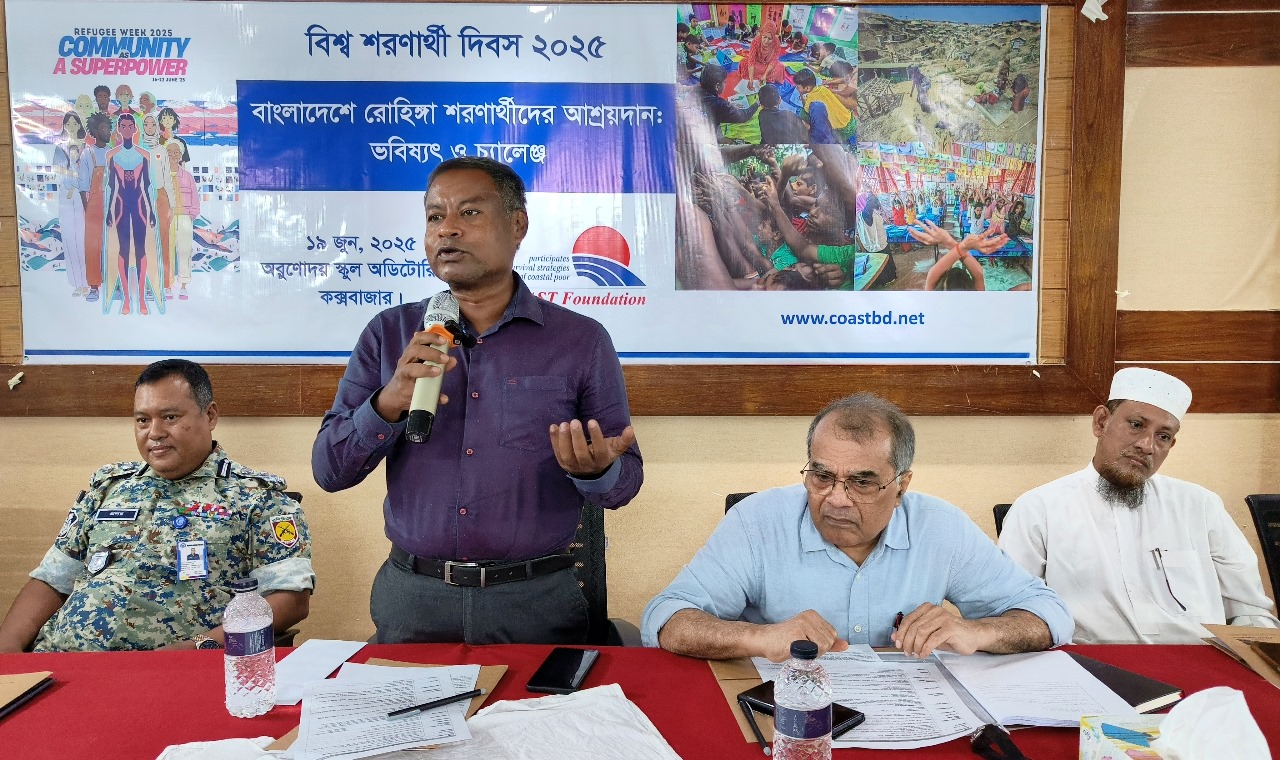Rezaul Karim Chowdhury
Published:2025-06-19 19:41:01 BdST
World Refugee Day 2025Local leadership need to be recognized in managing Rohingya refugee crisis
Stakeholders from government, civil society, the media, and humanitarian organizations representatives in Cox’s Bazar today discusses the future and growing challenges of hosting over one million Rohingya refugees in Bangladesh, as part of World Refugee Day 2025 observances.
The seminar, titled “Future and Challenges in Hosting Rohingya Refugees in Bangladesh”, was held at Arunodoy School’s auditorium on Circuit House Road.
Md. Shamsud Douza, Additional Refugee Relief and Repatriation Commissioner (Joint Secretary), presided over the discussion as chief guest, while DIG Proloy Chisim of the Armed Police Battalion (APBn), Cox’s Bazar, was present as honorable guest.
Distinguished speakers included Mahbubur Rahman; President of Cox’s Bazar Press Club, Nur Ahmed Anuari; Chairman of Whykong Union Parishad and District Ameer of Jamaat-e-Islami; Abul Kashem, Executive Director of Help Cox’s Bazar; Marko Miljevic; Access Coordinator of the NGO Platform and academic and researcher Dr. Mokbul Ahmed.
Other notable participants included researchers, journalists, lawyers, political representatives, and local government officials.
The event was moderated by Rezaul Karim Chowdhury, Executive Director of COAST Foundation, with a welcome speech delivered by Assistant Director Jahangir Alam.
Md. Shamsud Douza said the Rohingya crisis has entered a difficult phase due to falling international support.
“Many of our traditional donor countries are now grappling with other global humanitarian emergencies. Consequently, funding for the Rohingya response has decreased significantly,” he said.
Referring to the ongoing unrest in Myanmar’s Rakhine State, he added that conditions for safe and voluntary repatriation remain unfavourable.
Proloy Chisim stressed the need to maintain social harmony between the host community and the refugee population.
“The Rohingya live among us. While the government is committed to ensuring security, local communities and elected representatives must also play an active role,” he said.
He expressed concern that several critical projects had been halted or suspended due to funding gaps.
Marko Miljevic of the NGO Platform encouraged participants to view the crisis as an opportunity for constructive partnerships.
“With the government, UN agencies, and NGOs working together, we must remain patient and committed to safe, inclusive humanitarian efforts,” he noted.
Mahbubur Rahman warned that new Rohingya arrivals continue daily. “The pressure is increasing. Resettlement in third countries should be considered seriously to ease the burden on Bangladesh,” he said.
Nur Ahmed Anuari urged better coordination between camp management and local government.
“At least one monthly meeting should be held between Upazila and Union Parishads and the camp administration to identify and address issues,” he proposed.
Renowned researcher Nurul Islam called for immediate action. “We should not wait for the crisis to escalate further. We must act now to avoid irreversible consequences.”
Echoing this urgency, Dr. Mokbul Ahmed cautioned, “If we fail to act now, local communities may one day find themselves in similar conditions. Empathy must go both ways—the host community has been supportive, but respect must be mutual.”
Abul Kashem emphasized prioritizing interventions based on actual needs. “Without prioritization, we risk jeopardizing the overall humanitarian response. We must also look beyond traditional donors and explore new funding partners,” he said.
Shahadat Hossain, a political representative from Teknaf, said that decreasing funds and rising camp populations have already intensified existing challenges.
“A clear, long-term action plan is necessary to prevent further deterioration,” he added.
Rezaul Karim Chowdhury said “This is not Bangladesh’s problem alone—it is a global humanitarian failure. The Rohingya crisis is no longer merely a humanitarian concern; it has evolved into a complex economic, security, and diplomatic challenge. The compassion and generosity that Bangladesh has shown over the years now demand a stronger, more sustainable, and coordinated response from the international community. A durable solution will only emerge when global actors acknowledge and share this responsibility.”
From this seminar, below action points and agendas are come out-
The event will bring together key stakeholders to discuss and propose strategies for the following issues:
How can the Rohingya response effectively cope with the reduced level of aid?
How can host community sentiments and concerns related to local staff dropout be managed?
How can the growing population in the camps be managed, given that local communities oppose the expansion of camp areas?
How can the government and the Rohingya community collaborate to maintain law and order in the camps and prevent major threats to both Rohingya and host communities?
How can government and non-government actors strengthen international campaigns to achieve a permanent solution or repatriation for the Rohingya community?
How can the case at the International Court of Justice (ICJ) be strengthened and expedited to hold the Myanmar junta accountable for genocide? [Gambia has lodge case on these atrocities in the ICJ (International Court of Justice), usually mitigation of such case takes around 25 years.
What efforts can be made to mitigate threats to the economic development of Cox’s Bazar city?
How can the concerns of the Rohingya community regarding their relocation and stay in Bhasan-Char be addressed and minimized?
What role can local and international media play in raising awareness and combating misinformation about the Rohingya crisis?
What strategies can be adopted to foster social cohesion and peaceful coexistence between Rohingya refugees and host communities?
Unauthorized use or reproduction of The Finance Today content for commercial purposes is strictly prohibited.


